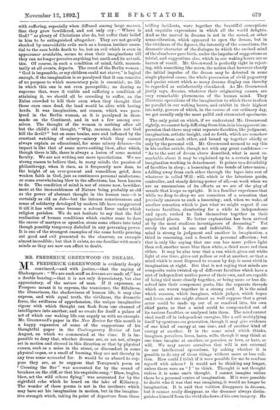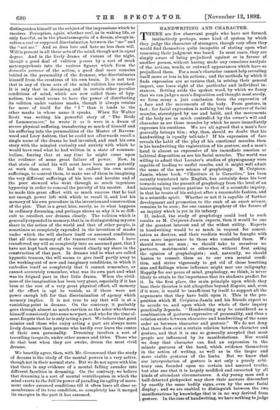MR. FREDERICK GREENWOOD ON DREAMS.
MR. FREDERICK GREENWOOD is evidently deeply convinced,—and with justice,—that the saying of Shakespeare : "We are such stuff as dreams are made of," has a double bearing,—that it is not only depreciatory, but also appreciatory, of the nature of man. If it expresses, as Prospero meant it to express, the transience, the fitfulness, the illusoriness, the shadowiness of human life, it may also express, and with equal truth, the vividness, the dramatic force, the swiftness of apprehension, the unique imaginative vigour with which thought can flash from one channel of intelligence into another, and so create for itself a palace of art of which our waking life can supply us with no example. Mr. Greenwood's paper in the Yew Review for this month is a happy expansion of some of the suggestions of his thoughtful paper in the Contemporary Review of last August, on which we commented at the time. It is im- possible to deny that, whether dreams are, or are not, always set in motion and steered in this direction or that by physical causes, such as a noise in the street, or discomfort in some physical organ, or a smell of burning, they are not thereby in any true sense accounted for. It would be as absurd to sup- pose they are, as to suppose that Tennyson's poem on
Crossing the Bar" was accounted for by the sound of breakers on the cliff, or that his exquisite song, " Blow, bugles, blow, set the wild echoes flying," was accounted for by the eightfold echo which he heard on the lake of Killarney. The wonder of these poems is not in the incidents which may have set his imagination in motion, but in the-imagina- tive strength which, taking its point of departure from these trifling incidents, wove together the beautiful conceptions and exquisite expressions in which all the world delights. And so the marvel in dreams is not in the sound, or other sense-vibration, which appeared to open the dream, but in the vividness of the figures, the intensity of the sensations, the dramatic character of the dialogue to which the excited mind of the slumberer gave birth, under the impulse of suggestions so trivial, and suggestions also, which in our waking hours are so barren of result. Mr. Greenwood is perfectly right in reject- ing, with something like scorn, the notion that however clearly the initial impulse of the dream may be detected in some single physical cause, the whole procession of vivid pageantry and quaint retort which so many dreams display can thereby be regarded as satisfactorily elucidated. As Mr. Greenwood justly says, dreams, whatever their originating causes, are very remarkable phenomena of the human mind. They illustrate operations of the imagination to which there is often no parallel in our waking hours, and exhibit in their highest intensity, powers of which, in the course of our ordinary day, we get usually only the most pallid and attenuated specimens.
The only point on which, if we understand Mr. Greenwood rightly, we cannot help differing from him, is in his apparent im- pression that there may exist separate faculties, like judgment, imagination, artistic insight, and so forth, which are somehow separated from each other, and bound up together chiefly or only by the personal will. Mr. Greenwood seemed to say this in his earlier article, though not with any great confidence :— " As to the sort of dream above described, what is most re- markable about it may be explained up to a certain point by imagination working in detachment. It points to a divisibility of faculties in sleep ; a loosening of the bonds of inter-union ; a falling away from each other through the lapse into rest of whatever is called Will : will, which is the laborious guide, controller, and steady driving-power of all,—at work when we are as unconscious of its efforts as we are of the play of muscle that keeps us upright. It is a familiar experience that while we drop to sleep we are conscious of a sensation that precisely answers to such a loosening ; and, when we wake, of another sensation which is just what we might expect if our various faculties, slumbering for a while in independence and apart, rushed to link themselves together in their appointed places. No better explanation has been arrived at by the most studious investigators of dreaming." Yet surely the mind is one and indivisible. No doubt one mind is strong in judgment and another in imagination, a third in reasoning, and a fourth in personal affection ; but that is only like saying that one sun has more yellow light than red, another more blue than white, a third more red than either. It may be also true that a sun which gives out white light at one time, gives out yellow or red at another, or that a mind which is most disposed to reason by day, is most vivid in imagination at night. But that is not saying that minds are composite units twisted up of different faculties which have a sort of independent motive power of their own, and are capable of being tied more closely together, or being more or less dis- solved into their component parts, like the separate threads which are woven together in a strong cord. It is the mind which reasons, which imagines, which judges, which hopes and loves, and one might almost as well suppose that a great actor could be made up out of, or resolved into, his own chief parts, as that a mind could be compounded out of its various faculties, or analysed into them. The mind cannot shed itself off in independent energies, like a cell multiplying itself by spontaneous generation, though it may give evidence of one kind of energy at one time, and of another kind of energy at another. It is the same mind which thinks, imagines, perceives, loves, hates, wills, though it may think at one time, imagine at another, or perceive, or love, or hate, or will. We may assure ourselves that will is not external to our intellectual operations, by asking whether it is possible to do any of these things without more or less voli- tion. How could I think if it were possible for me to confuse myself with others ? It would not be thinking any longer, unless there were an " I " to think. Thought is not thought unless it is some one's thought. I cannot imagine unless there be a personal centre of imagination. If it were possible to doubt who it was that was imagining, it would no longer be imagination. It is said that volition disappears in dreams, but it cannot really disappear, as the dreamer always distin- guishes himself from the vivid shadows of his own imagery. He
distinguishes himself as the subject of the impressions which he receives. Perception, again, whether real, as in waking life, or only fanciful, as in the phantasmagoria of a dream, always in- volves a real or supposed discrimination between the "me" and the "not me." And so does love and hate no less than will. Will is present in all these acts of the mind, though not in equal degree. And in the lively drama of visions of the night, though a good deal of volition passes by a sort of mock metempsychosis into the various figures which form the dramatis personx of the action, a good deal more remains behind in the personality of the dreamer, who discriminates himself from the creations of his own brain. It is not true that in any of these acts of the mind volition has vanished. It is only that in dreaming, and in certain other peculiar conditions of mind, which are now called those of hyp- notism, the mind seems to have the power of distributing its volition under various masks, though it always retains far more of itself for the " I " than it lends to the other masks in whose name it speaks. When Sir Walter Scott was writing his powerful story of "The Bride of Lammermoor," he wrote it as it were in a dwam of severe physical suffering, transferring so much of himself and his suffering into the personalities of the Master of Ravens- wood and Lucy Ashton, that he could not afterwards recall a single scene of the drama he had invented, and read his own story with the mingled curiosity and anxiety with which he would have read what he had written in a state of somnam- bulism, fearing that at any time he might come upon the evidence of some great failure of power. Now, in that state of mind his will must have been more potently at work than ever. He had to endure his own acute sufferings, to control them, to make use of them in imagining the very different sufferings of his hero and heroine and of the poor steward who went through so much ingenious hypocrisy in order to conceal the poverty of his master. And he made this great effort with so much success that he had not enough power left with which to recall it, and lost his memory of his own procedure in the invention and construction of the plot. That is a great hint, surely, as to what happens in ordinary dreaming, and perhaps shows us why it is so diffi- cult to recollect our dreams clearly. The volition which is generally expended in memory, that is, in distinguishing myown share in the action of the world and that of other people, is sometimes so completely expended in the invention of masks under which the will shelters itself on assumed conditions, that all clear memory of the transaction vanishes. I have transferred my will so completely into an assumed part, that I have not kept back enough to record clearly my share in the .construction of that part. In dreams and in what are called hypnotic trances, the will seems to give itself partly away to the working-out of new and imaginary conditions, in which it embodies itself so completely that it cannot remember, or cannot accurately remember, what was its own part and what was its feigned part in that little drama. When the vivid- ness of the imagination has been very great, especially if it has been at the cost of a very great physical effort, all memory of the effort is apt to vanish, as if there were not power enough left for that discrimination of agency which memory implies. It is not true to say that will is at a vanishing-point in dreams. On the contrary, it probably goes through almost as much exertion as the actor who throws himself consciously into some newpart, and who for the time al- most forgets that he is only acting a part. We believe that good mimics and those who enjoy acting a part are always more lively dreamers than persons who hardly ever leave the centre of their own personality. Dreaming involves a sort of travelling incognito, under other names and titles. Those who do that best when they are awake, dream the most vivid dreams.
We heartily agree, then, with Mr. Greenwood that the study of dreams is the study of the mental powers in a very active, though not in their normal state. But we do not agree with him that there is any evidence of a mental falling asunder into different faculties in dreaming. On the contrary, we believe that dreaming is a sort of mental ventriloquism in which the mind exerts to the full its power of parading its agility of move- ment under assumed conditions till it often loses all clear re- membrance of its true condition, so completely has it merged its energies in the part it has assumed.







































 Previous page
Previous page